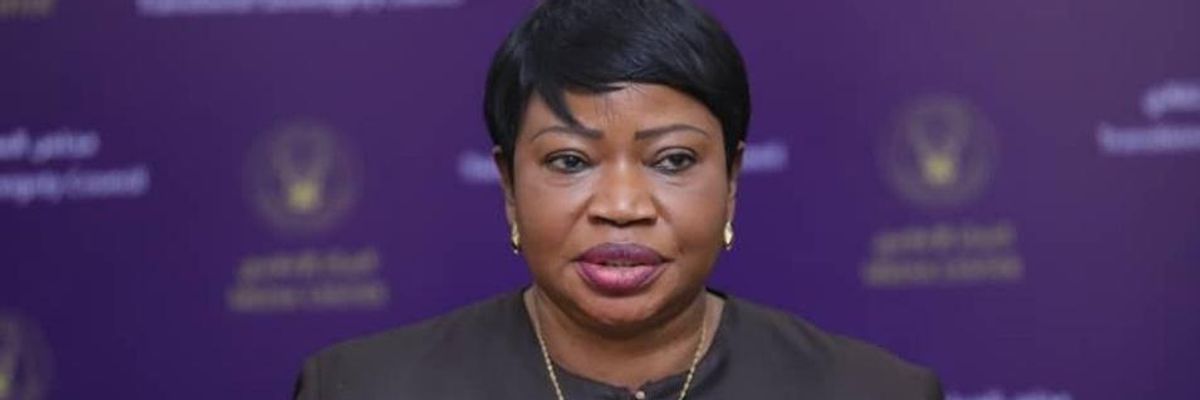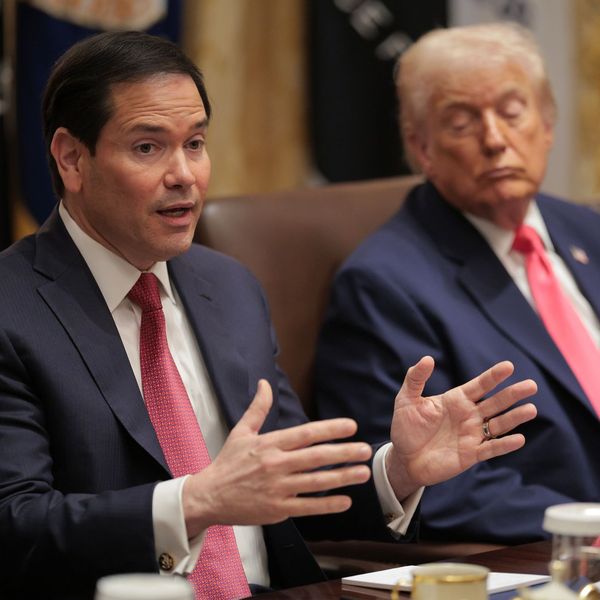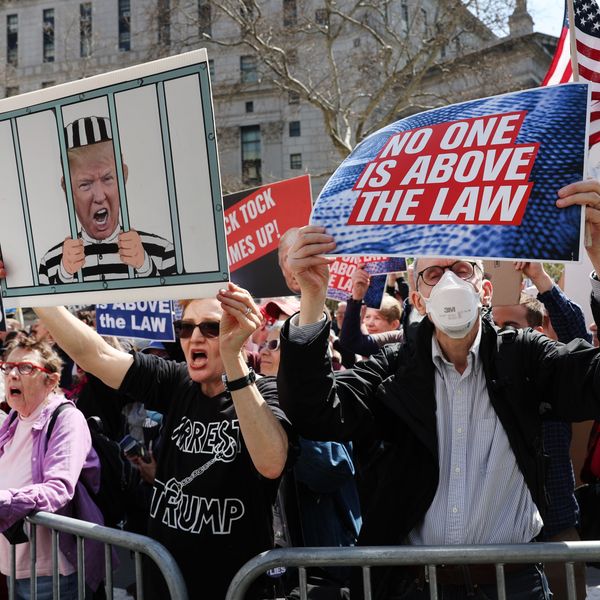
International Criminal Court (ICC) Chief Prosecutor Fatou Bensouda, seen here during an October 18, 2020 visit to Sudan, has been targeted with U.S. sanctions for permitting an investigation of alleged American and allied war crimes in Afghanistan. (Photo: Mahmoud Hjaj/Anadolu Agency via Getty Images)
Federal Judge Blocks Trump Order Targeting Lawyers Supporting ICC Afghan War Crimes Probe
"National security concerns must not become a talisman used to ward off inconvenient claims, a 'label' used to 'cover a multitude of sins.'"
A federal judge in New York on Monday issued an injunction against President Donald Trump's June executive order sanctioning human rights lawyers cooperating with an International Criminal Court investigtion of alleged U.S. war crimes in Afghanistan.
U.S. District Judge Katherine Polk Failla in Manhattan issued a preliminary injunction (pdf) barring the Trump administration from targeting four law professors with criminal or civil penalties for supporting the work of the ICC in its investigation of alleged extrajudicial killing, torture, rape, and other potential war crimes committed by military and CIA personnel and allied forces during the ongoing 19-year war in Afghanistan--the longest campaign of the so-called War on Terror.
"The executive order is misguided and unconstitutional, violating our fundamental rights to free speech."
--James Goldston,
Open Society Justice Initiative
"The court is mindful of the government's interest in defending its foreign policy prerogatives and maximizing the efficacy of its policy tools," Failla wrote. "Nevertheless, national security concerns must not become a talisman used to ward off inconvenient claims, a 'label' used to 'cover a multitude of sins.'"
The ruling came in a case filed last October by the Open Society Justice Initiative and professors Diane Marie Amann, Margaret deGuzman, Gabor Rona, and Milena Sterio, who argued that Trump's order violates their constitutional rights.
Failla determined that Trump's order unconstitutionally prohibits free speech "so as to induce [ICC officials] to desist from their investigation of U.S. and allied personnel."
James Goldston, executive director of the Open Society Justice Initiative, welcomed Failla's decision, saying in a statement that the injunction "affirms what we have said from the start: the executive order is misguided and unconstitutional, violating our fundamental rights to free speech."
\u201c\ud83d\udce2 Win! Thanks to @OSFJustice for leading challenge to Trump admin's dangerous effort to interfere with #ICC work. Now, @Transition46 @JoeBiden must rescind the Executive Order, which still threatens a broad swathe of HR lawyers, ICC staff, advocates, victims- & int'l justice.\u201d— Katherine Gallagher (@Katherine Gallagher) 1609818622
The lawsuit came a month after Trump imposed sanctions targeting Fatou Bensouda and Phakiso Mochochoko, the ICC's chief prosecutor and prosecution jurisdiction division director, respectively, in retaliation for their scrutinty of U.S. wartime conduct.
U.S. Secretary of State Mike Pompeo declared at the time that "the United States has never ratified the Rome Statute that created the court, and we will not tolerate its illegitimate attempts to subject Americans to its jurisdiction."
In April 2019, the ICC Pre-Trial Chamber II announced it would not grant a request by Bensouda to open an investigation into alleged war crimes and crimes against humanity, including deliberate attacks on civilians and child soldier conscription by Taliban militants, torture and sexual violence by members of Afghan National Security Forces, and torture of prisoners held in U.S. military and secret CIA prisons in Afghanistan, Poland, Romania, and Lithuania.
The decision was condemned by human rights advocates, many of whom accused the ICC of bowing to intense pressure from the Trump administration after it barred Bensouda, a Gambian national, from entering the United States. The administration threatened further retaliation, including travel bans and economic sanctions, against the ICC.
In December 2019, the ICC convened a three-day hearing in The Hague, Netherlands at which prosecutors and Afghan victims of alleged U.S. and Afghan government torture pleaded with court officials to reverse their April decision and conduct a war crimes probe. The ICC unanimously ruled in March 2020 that the investigation could proceed. Pompeo condemned the decision, calling the ICC "an unaccountable political institution masquerading as a legal body."
In July 2020, top Trump officials were further incensed after prominent Canadian jurist William Schabas submitted a request to the ICC to investigate senior U.S. and Israeli officials for alleged war crimes committed against the Palestinian people.
Looking ahead to Trump's January 20 departure from the White House, Goldston asserted that "rather than spending time defending an order in direct conflict with Washington's historic support for international justice, the incoming administration should rescind it on day one."
According to Reuters, the incoming Biden administration may consider lifting sanctions against the ICC officials, pending an evaluation of the role of sanctions in U.S. foreign policy.
An Urgent Message From Our Co-Founder
Dear Common Dreams reader, The U.S. is on a fast track to authoritarianism like nothing I've ever seen. Meanwhile, corporate news outlets are utterly capitulating to Trump, twisting their coverage to avoid drawing his ire while lining up to stuff cash in his pockets. That's why I believe that Common Dreams is doing the best and most consequential reporting that we've ever done. Our small but mighty team is a progressive reporting powerhouse, covering the news every day that the corporate media never will. Our mission has always been simple: To inform. To inspire. And to ignite change for the common good. Now here's the key piece that I want all our readers to understand: None of this would be possible without your financial support. That's not just some fundraising cliche. It's the absolute and literal truth. We don't accept corporate advertising and never will. We don't have a paywall because we don't think people should be blocked from critical news based on their ability to pay. Everything we do is funded by the donations of readers like you. Will you donate now to help power the nonprofit, independent reporting of Common Dreams? Thank you for being a vital member of our community. Together, we can keep independent journalism alive when it’s needed most. - Craig Brown, Co-founder |
A federal judge in New York on Monday issued an injunction against President Donald Trump's June executive order sanctioning human rights lawyers cooperating with an International Criminal Court investigtion of alleged U.S. war crimes in Afghanistan.
U.S. District Judge Katherine Polk Failla in Manhattan issued a preliminary injunction (pdf) barring the Trump administration from targeting four law professors with criminal or civil penalties for supporting the work of the ICC in its investigation of alleged extrajudicial killing, torture, rape, and other potential war crimes committed by military and CIA personnel and allied forces during the ongoing 19-year war in Afghanistan--the longest campaign of the so-called War on Terror.
"The executive order is misguided and unconstitutional, violating our fundamental rights to free speech."
--James Goldston,
Open Society Justice Initiative
"The court is mindful of the government's interest in defending its foreign policy prerogatives and maximizing the efficacy of its policy tools," Failla wrote. "Nevertheless, national security concerns must not become a talisman used to ward off inconvenient claims, a 'label' used to 'cover a multitude of sins.'"
The ruling came in a case filed last October by the Open Society Justice Initiative and professors Diane Marie Amann, Margaret deGuzman, Gabor Rona, and Milena Sterio, who argued that Trump's order violates their constitutional rights.
Failla determined that Trump's order unconstitutionally prohibits free speech "so as to induce [ICC officials] to desist from their investigation of U.S. and allied personnel."
James Goldston, executive director of the Open Society Justice Initiative, welcomed Failla's decision, saying in a statement that the injunction "affirms what we have said from the start: the executive order is misguided and unconstitutional, violating our fundamental rights to free speech."
\u201c\ud83d\udce2 Win! Thanks to @OSFJustice for leading challenge to Trump admin's dangerous effort to interfere with #ICC work. Now, @Transition46 @JoeBiden must rescind the Executive Order, which still threatens a broad swathe of HR lawyers, ICC staff, advocates, victims- & int'l justice.\u201d— Katherine Gallagher (@Katherine Gallagher) 1609818622
The lawsuit came a month after Trump imposed sanctions targeting Fatou Bensouda and Phakiso Mochochoko, the ICC's chief prosecutor and prosecution jurisdiction division director, respectively, in retaliation for their scrutinty of U.S. wartime conduct.
U.S. Secretary of State Mike Pompeo declared at the time that "the United States has never ratified the Rome Statute that created the court, and we will not tolerate its illegitimate attempts to subject Americans to its jurisdiction."
In April 2019, the ICC Pre-Trial Chamber II announced it would not grant a request by Bensouda to open an investigation into alleged war crimes and crimes against humanity, including deliberate attacks on civilians and child soldier conscription by Taliban militants, torture and sexual violence by members of Afghan National Security Forces, and torture of prisoners held in U.S. military and secret CIA prisons in Afghanistan, Poland, Romania, and Lithuania.
The decision was condemned by human rights advocates, many of whom accused the ICC of bowing to intense pressure from the Trump administration after it barred Bensouda, a Gambian national, from entering the United States. The administration threatened further retaliation, including travel bans and economic sanctions, against the ICC.
In December 2019, the ICC convened a three-day hearing in The Hague, Netherlands at which prosecutors and Afghan victims of alleged U.S. and Afghan government torture pleaded with court officials to reverse their April decision and conduct a war crimes probe. The ICC unanimously ruled in March 2020 that the investigation could proceed. Pompeo condemned the decision, calling the ICC "an unaccountable political institution masquerading as a legal body."
In July 2020, top Trump officials were further incensed after prominent Canadian jurist William Schabas submitted a request to the ICC to investigate senior U.S. and Israeli officials for alleged war crimes committed against the Palestinian people.
Looking ahead to Trump's January 20 departure from the White House, Goldston asserted that "rather than spending time defending an order in direct conflict with Washington's historic support for international justice, the incoming administration should rescind it on day one."
According to Reuters, the incoming Biden administration may consider lifting sanctions against the ICC officials, pending an evaluation of the role of sanctions in U.S. foreign policy.
A federal judge in New York on Monday issued an injunction against President Donald Trump's June executive order sanctioning human rights lawyers cooperating with an International Criminal Court investigtion of alleged U.S. war crimes in Afghanistan.
U.S. District Judge Katherine Polk Failla in Manhattan issued a preliminary injunction (pdf) barring the Trump administration from targeting four law professors with criminal or civil penalties for supporting the work of the ICC in its investigation of alleged extrajudicial killing, torture, rape, and other potential war crimes committed by military and CIA personnel and allied forces during the ongoing 19-year war in Afghanistan--the longest campaign of the so-called War on Terror.
"The executive order is misguided and unconstitutional, violating our fundamental rights to free speech."
--James Goldston,
Open Society Justice Initiative
"The court is mindful of the government's interest in defending its foreign policy prerogatives and maximizing the efficacy of its policy tools," Failla wrote. "Nevertheless, national security concerns must not become a talisman used to ward off inconvenient claims, a 'label' used to 'cover a multitude of sins.'"
The ruling came in a case filed last October by the Open Society Justice Initiative and professors Diane Marie Amann, Margaret deGuzman, Gabor Rona, and Milena Sterio, who argued that Trump's order violates their constitutional rights.
Failla determined that Trump's order unconstitutionally prohibits free speech "so as to induce [ICC officials] to desist from their investigation of U.S. and allied personnel."
James Goldston, executive director of the Open Society Justice Initiative, welcomed Failla's decision, saying in a statement that the injunction "affirms what we have said from the start: the executive order is misguided and unconstitutional, violating our fundamental rights to free speech."
\u201c\ud83d\udce2 Win! Thanks to @OSFJustice for leading challenge to Trump admin's dangerous effort to interfere with #ICC work. Now, @Transition46 @JoeBiden must rescind the Executive Order, which still threatens a broad swathe of HR lawyers, ICC staff, advocates, victims- & int'l justice.\u201d— Katherine Gallagher (@Katherine Gallagher) 1609818622
The lawsuit came a month after Trump imposed sanctions targeting Fatou Bensouda and Phakiso Mochochoko, the ICC's chief prosecutor and prosecution jurisdiction division director, respectively, in retaliation for their scrutinty of U.S. wartime conduct.
U.S. Secretary of State Mike Pompeo declared at the time that "the United States has never ratified the Rome Statute that created the court, and we will not tolerate its illegitimate attempts to subject Americans to its jurisdiction."
In April 2019, the ICC Pre-Trial Chamber II announced it would not grant a request by Bensouda to open an investigation into alleged war crimes and crimes against humanity, including deliberate attacks on civilians and child soldier conscription by Taliban militants, torture and sexual violence by members of Afghan National Security Forces, and torture of prisoners held in U.S. military and secret CIA prisons in Afghanistan, Poland, Romania, and Lithuania.
The decision was condemned by human rights advocates, many of whom accused the ICC of bowing to intense pressure from the Trump administration after it barred Bensouda, a Gambian national, from entering the United States. The administration threatened further retaliation, including travel bans and economic sanctions, against the ICC.
In December 2019, the ICC convened a three-day hearing in The Hague, Netherlands at which prosecutors and Afghan victims of alleged U.S. and Afghan government torture pleaded with court officials to reverse their April decision and conduct a war crimes probe. The ICC unanimously ruled in March 2020 that the investigation could proceed. Pompeo condemned the decision, calling the ICC "an unaccountable political institution masquerading as a legal body."
In July 2020, top Trump officials were further incensed after prominent Canadian jurist William Schabas submitted a request to the ICC to investigate senior U.S. and Israeli officials for alleged war crimes committed against the Palestinian people.
Looking ahead to Trump's January 20 departure from the White House, Goldston asserted that "rather than spending time defending an order in direct conflict with Washington's historic support for international justice, the incoming administration should rescind it on day one."
According to Reuters, the incoming Biden administration may consider lifting sanctions against the ICC officials, pending an evaluation of the role of sanctions in U.S. foreign policy.

